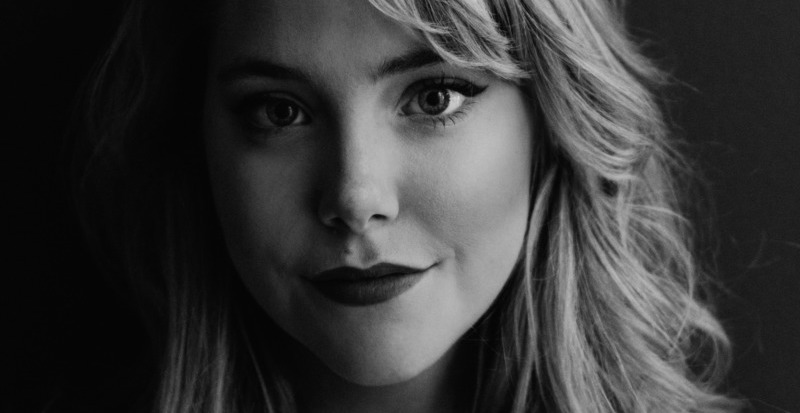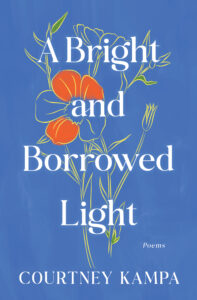
Poetry for Everyone: Remembering Courtney Kampa
On Creating a Posthumous Collection That Captures a Vibrant Life and Creative Ethos
Courtney collected small happinesses. Red lipstick. The permanent kiss-mark on a dog’s face. Scrawling a line of poetry on a mirror in a public place. The art of forgiveness. Music. Ballet. The people who populated her life, referred to always by their full names. Linking arms with a friend for a full day. Misty Virginia mornings. Riding her bike through dappled California light. Her personal library. Dogears, underlines, and peonies marking each favorite page. In a journal of quotes and doodles, she wrote, “no matter our age, we all have so much to live for.”
When she passed away suddenly in 2022, at the age of thirty-five, the grief for us was wordless. We each met and fell in love with Courtney in poetry programs: Catherine met her in the Columbia MFA program, T at the Wallace Stegner Fellowship. She treated us—as she did all her friends—like we were characters in a novel. Like it was an unbelievable thrill to encounter each other in real life.
We hope reading A Bright and Borrowed Light will create, for the reader, the experience of knowing her: intimate, warm, and all-encompassing.
In the aftermath of her death, her husband entrusted us with the task of sorting through her hard drives and scans: hundreds of pages of notes, old poetry drafts, and published works. We spent the summer of 2023 reading everything she’d saved or handwritten since 2009. In this way, we came to know Courtney more deeply, to understand the trajectory of her life as a poet, to see what lines, images, and big, unanswerable questions had followed her from adolescence into adulthood.
Neither of us had ever worked on a posthumous collection before. We made rules for ourselves to honor what we believe Courtney would’ve wanted. Some of this relied on memory. We recalled wishes she’d shared with us in conversation over the years: to have a wide readership, to be published with a “big 5” publisher, to buy back the rights to her first collection and reissue it, altered and expanded upon.
We read old poems, unpacking her digital archive. At times, we encountered dozens of versions of the same piece, written and rewritten over the course of an entire decade. As poets ourselves, we wondered how to bring those unresolved pieces to the page, how and if Courtney would have wanted them presented. In those instances, we developed our most important rule as assemblers: we could cut, but never add, language to a poem. And the cuts would be minimal — mainly for clarity.
For example, “The Cool Kids” (a poem Courtney started writing as an undergraduate student and never finished), follows the speaker as she witnesses a group of teenagers tip a cow. Here’s an excerpt:
I stood there slack-jawed at the foam
and ferment. I wondered if this is what it feels like
to be pinned down by the sky. If the sensation around my ankles
had something to do with being tangled
in my own shadow.
While the poem as a whole needed work, we knew we had to include it because of this passage, which we left exactly as we found it. The scene demonstrates Courtney’s capacious approach to metaphor. Coupling the foam and ferment with the idea of teenage boys, the image of the toppled cow suggests a gendered and sexualized power imbalance. The cow, like the girls, reacts to the violence of her body becoming a spectacle. Courtney could have left the poem there. What distinguishes her work are the leaps she takes to push the metaphor further: to be “pinned down by the sky” is also to be “tangled/in my own shadow.” An external force threatening damage is mirrored by an internal force. That foggy conclusion leaves the reader in the position of the speaker herself, asking questions about her own capacity to sympathize against her tendency to wonder.
Our goal was to retrieve as much of her work as possible. To that end, we saved several fragments she had scrawled on their own pages in her notebooks, underlined with hearts around them. She loved these lines, and tried and failed repeatedly to work them into full-length poems. As we read them, we felt this was their power—that they could exist alone on a page, stray thoughts she’d set apart and left glistening. To honor her voice and her work, we included them in the book, where they float alone, functioning also as section breaks.
It’s from one of these fragments that we also found the title for the new collection:
Like a bell shaken from someone’s hands
I also gleam, with as much of noon as I can take
anointed with a bright and borrowed light.
The decision to include these fragments as their own pages is where you see our intervention the most in A Bright and Borrowed Light. Courtney valued intimacy with the reader, and we felt including these moments she chased for years across many pages and many poems would garner a sense of closeness with her style and her process.
We hope her work will gain all of the attention and love it has always deserved, and that readers, even those who aren’t ordinarily drawn to poetry, will find it.
Running underneath all of our efforts was heartache, sorrow, and anxiety over her loss. How many times did one of us pick up the phone to call the other, in the absence of being able to call Courtney herself? Wondering what she would’ve wanted was daunting. But more daunting was the increasing realization that she was gone. We saw women that resembled her. In the park, on the street. We felt her everywhere. Once, on a call with T, Catherine was walking circles near her house in San Francisco when a hawk swooped down and landed (unusually) on the ground in front of her, blocking the way. Its wings were slick with rain. It opened them to reveal an incredible wingspan, staring unflinchingly at the road ahead before alighting again.
On another occasion, T was sitting to add notes to the manuscript document when she opened her copy of Courtney’s first collection and a handwritten birthday letter from Courtney fell out. A swirly cupcake with a lit candle drawn on the envelope. That night, she dreamt she was sitting in a living room when Courtney ran in, laughed mischievously, and vanished through the wall. Flash of blonde hair and tall legs. The emptiness of the doorway.
As editors, we knew what our job was. As friends, we didn’t know how much we were entitled to talk about our pain and confusion over losing her. Theodore Roethke speaks of this feeling in his poem “Elegy for Jane,” where he grapples with his grief for a student he’s lost, despite the fact that he has“no rights in this matter.” To one another, we expressed wonder over Courtney’s many amazing qualities, the caliber of her poems, and our last visits with her. The pits in our throats.Courtney was stylish, charming, and theatrical. She was also private, passionate, and faithful. You could feel close to her. She could also feel like a mystery.
We hope reading A Bright and Borrowed Light will create, for the reader, the experience of knowing her: intimate, warm, and all-encompassing. Like an embrace, or a journal fallen open to a hand-written page. Courtney wanted everyone to love poetry. Her work, even when it fought with difficult subjects, had a tenderness and generosity towards the reader. She infused her poems with sweetness and humor that appeared in surprising descriptions: a carrot-colored horse. A flower-bothered basketball court.
Her death changes us both. It continues to feel impossible to talk and write about. As much as her book is a testament to her being, it is also a reminder that she is gone. It means everything to us to hold it. It hurts just as much. We hope that A Bright and Borrowed Light will show you her outrageous talent, beauty, and spirit. We hope her work will gain all of the attention and love it has always deserved, and that readers, even those who aren’t ordinarily drawn to poetry, will find it. Bringing poetry into people’s lives was a skill of hers, and one of her deepest wishes.
__________________________________

A Bright and Borrowed Light by Courtney Kampa is available from William Morrow, an imprint of HarperCollins Publishers.
Catherine Pond and T Bambrick
T (Taneum) Bambrick is the author of Intimacies, Received(Copper Canyon Press 2022), and Vantage (American Poetry Review/Honickman First Book Award 2019). Their work can be found in the New Yorker, The Nation, American Poetry Review, and elsewhere. A 2020 Wallace Stegner Fellow, they have received fellowships from the Sewanee Writer’s Conference, Community of Writers, Vermont Studio Center, and the Key West Literary Seminar, as well as scholarships from the Bread Loaf Writer’s Conference and the Bread Loaf Environmental Writer’s Conference. She lives in Los Angeles and is a Dornsife Fellow in the creative writing PhD program at the University of Southern California.
Catherine Pond is the author of Fieldglass. Her poems have appeared in journals including Virginia Quarterly Review, Oxford Poetry, and The Missouri Review. She is the 2025 recipient of The American Poetry Review’s Stanley Kunitz Prize. Pond holds a PhD in Creative Writing from the University of Southern California.



















